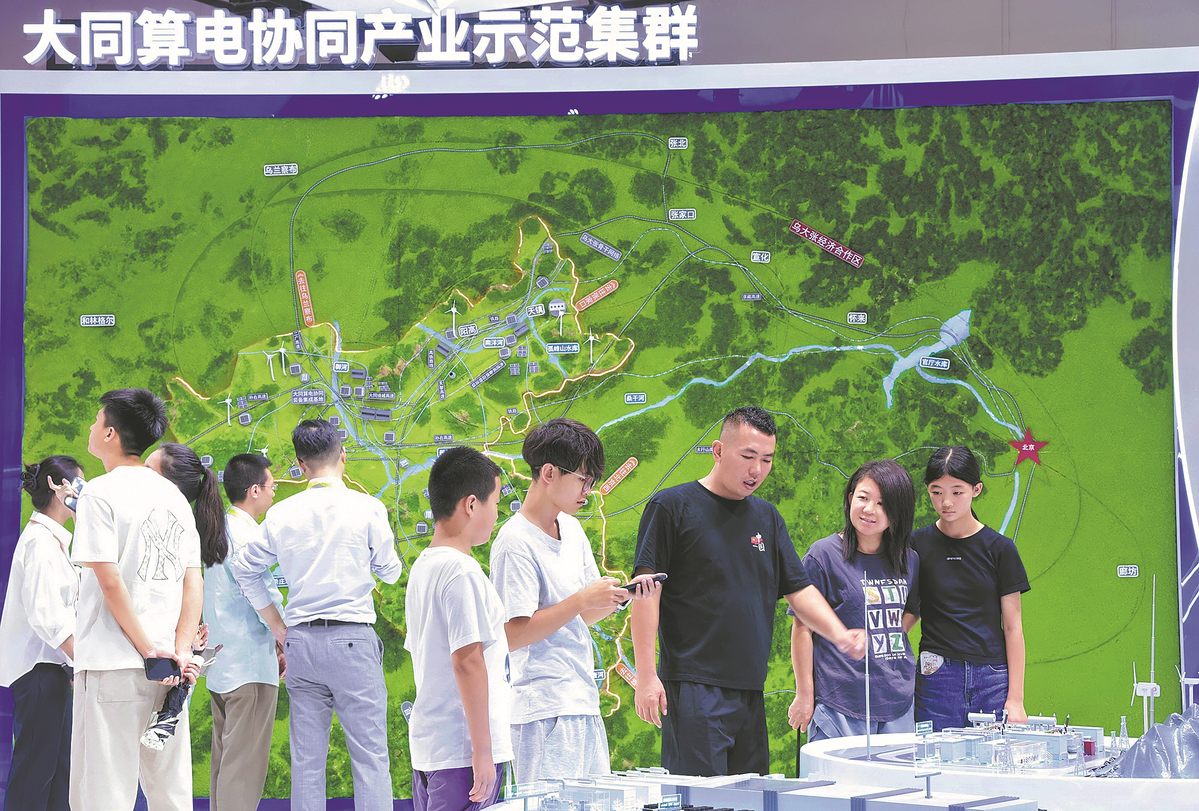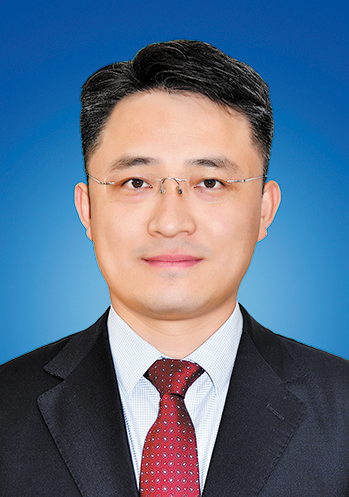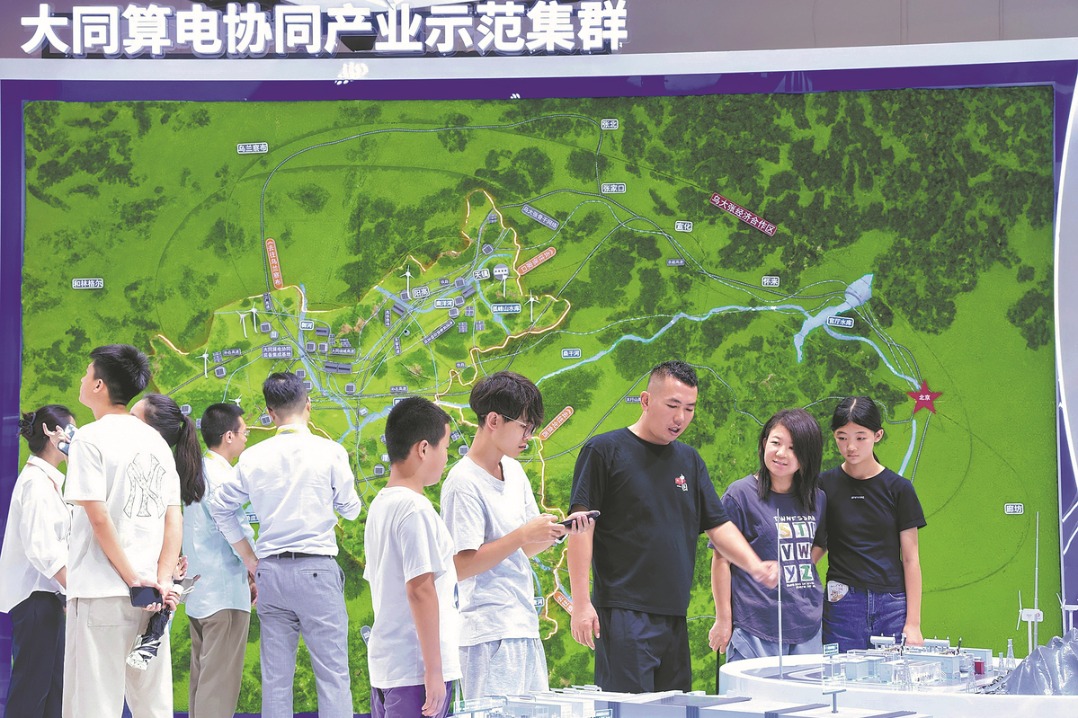
Visitors tour the Shanxi booth showcasing its computational power development at the 2025 China Computational Power Conference, held from Aug 22 to 24, in Datong, Shanxi province. [Photo provided to China Daily]
The city of Datong in Shanxi province is accelerating high-quality development in the computing power sector and is aiming to build a first-class base in China while advancing the digital economy, its mayor said.
In recent years, Datong has focused on energy, computing power and culture, achieving significant progress in transforming its resource-based economy, Mayor Liu Junyi said. The city has seen strong momentum in the computing power industry.
“Computing power, as a new quality productive force in the digital economy era, can directly drive industrial upgrading and innovation,” Liu said. “So far, Datong”s computing power industry has received a cumulative investment of 77.3 billion yuan ($10.8 billion), with 736,000 servers in operation.”
The city’s computing power capacity has reached nearly 25,000 petaflops, Liu said. Its computing power center consumed 4.3 billion kilowatt-hours of electricity in 2024, a figure expected to exceed 6 billion kWh in 2025.
As one of the first intelligent pilot cities in Shanxi, Datong has strengthened its digital foundation to provide more precise and efficient data support for urban governance and public services, he said. The city has aggregated more than 5.97 billion intelligent city data entries, empowering fields such as governance, culture, tourism, eldercare, government affairs, urban management and transportation.
Datong is also promoting the localization of DeepSeek and has launched the DeepTong intelligent application, integrating large model applications into areas such as public resource transactions, the 12345 Datong government service convenience hotline and targeted investment attraction to improve government services, Liu said.
China is a global leader in digital infrastructure in both scale and technological level. As of June, it had more than 4.55 million 5G base stations and about 226 million gigabit broadband users. Its total computing power scale ranks second globally, significantly driving socioeconomic development.
Shanxi has established a capital-centered computing power cluster with Datong at the core. The China Comprehensive Computing Power Index (2025) shows Datong’s urban computing power sub-index ranks third nationwide.

Liu Junyi
“Datong will actively integrate into the national integrated computing power network and strengthen upstream and downstream industries such as data annotation and server manufacturing,” Liu said. “We will explore areas such as computing-network integration, storage-computing integration and cross-regional computing power scheduling, aiming to build a nationally influential green data center cluster and computing power center city — shifting the economic growth model from producing coal and electricity to computing power and services.”
In the coming years, investment in intelligent and supercomputing centers by leading computing power enterprises is expected to surpass 100 billion yuan, according to city officials.
The 2025 China Computational Power Conference, the country’s top event in the field, was held in Datong in late August. Liu said the city’s advantages — including location, climate, green electricity, fiber optics, power grid and industrial ecology — made it the right choice to host the conference.
“Datong’s computing power industry has formed a full-chain development pattern and is actively promoting the extension of the digital industry upstream and downstream,” Liu said. Based on the construction of the Capital-Circling-Taihang Mountain computing power center cluster, the city has attracted several major server manufacturers. Downstream industries have established a national data annotation base, drawing 67 companies that have created over 30,000 jobs.
Known for its computing power, Datong also offers a strong ecosystem for industrial development, Liu said.
“Datong will fully showcase its comparative advantages to attract more domestic and international computing power companies and talent,” he said. “We are striving to achieve greater breakthroughs in technological innovation, project construction and industrial applications, injecting strong momentum into the transformation and development of the resource-based economy.”
With a history and culture spanning 2,300 years, Datong is also seeing growth in its cultural and tourism market, boosting its international influence and appeal, Liu said.
The domestic video game Black Myth: Wukong and the popular animated film Nobody incorporated many ancient architectural elements from the city.
“Datong is fully leveraging the advantages of its computing power industry cluster, continuously strengthening the construction of cultural digital infrastructure and service platforms and focusing on creating new cultural digital consumption scenarios,” Liu said.
In cultural heritage, the digital Yungang Grottoes project has used high-precision 3D laser scanning, close-range photogrammetry and multispectral technologies to solve challenges in collecting high-relief grotto images. It has completed 80 percent of information collection at the Yungang Grottoes and two-thirds of archival data aggregation.
“The 3D printing system and modular assembly of Yungang Grottoes have pioneered the world’s first full-scale replication of extra-large cultural relics, extending cultural heritage from the grotto site to online platforms,” Liu said. “The millennia-old grotto art is shining with new brilliance in the new era.”

